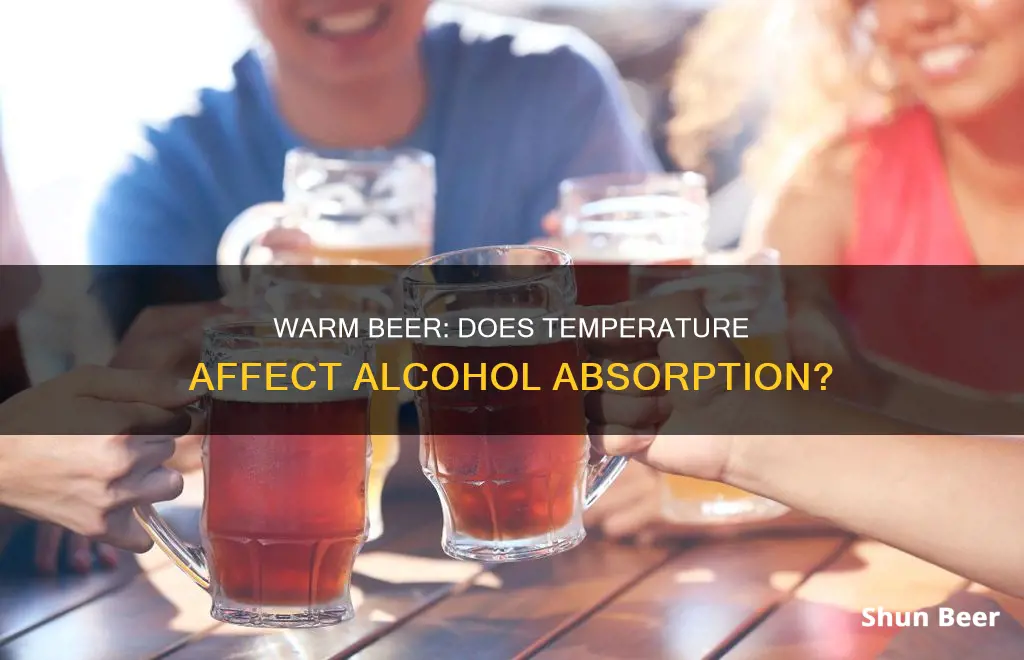
Drinking warm beer will not make you more drunk, but drinking in hot weather can increase the effects of alcohol. At higher temperatures, body cells contain less fluid, so the alcohol in the body is more concentrated, and the intoxication is stronger. The liver takes the same amount of time to break down alcohol in hot weather as in cooler weather. However, the placebo effect of expecting a higher alcohol content can make you feel drunker, even if your blood alcohol content is the same.
| Characteristics | Values |
|---|---|
| Does drinking warm beer make you more drunk? | No, studies have shown no difference in individuals' blood-alcohol levels after consuming alcoholic beverages at different temperatures. |
| Why does warm beer not make you more drunk? | The belief that warm alcohol will get you more drunk comes from the volatile alcohol compounds. Since the flavor of alcohol becomes stronger at higher temperatures, it is understandable that some would expect to feel its effects more powerfully. |
| Does the temperature affect the taste of the beer? | Yes, our ability to taste different flavors doesn't change equally at different temperatures: sweetness has the highest difference between hot and cold, followed by bitterness, and then sourness. |
| Does drinking alcohol in hot weather get you drunk faster? | Yes, alcohol gets you drunk faster in hot weather as body cells contain less fluid, resulting in a more concentrated and stronger effect of alcohol in the body. |
What You'll Learn

The placebo effect of warm beer
So, where does this belief come from? The answer lies in the volatile alcohol compounds. As the temperature rises, the flavour of alcohol intensifies. This leads people to expect a stronger impact from their drink, which is simply not the case. However, the power of suggestion is a curious thing, and the expectation of a higher alcohol content can indeed make one feel more inebriated.
This placebo effect is so strong that it can trick your brain into experiencing enhanced effects from alcohol, even if you are aware of the underlying science. So, if you anticipate a greater kick from your beer, warming it up might just do the trick, without actually increasing your blood alcohol content.
The idea that warm beer leads to increased intoxication is not a new one. In the 19th century, it was quite common to be served warmed ale during the cold winter months. Warm beer was believed to aid digestion and was even used in recipes for warm porridges and flip, a concoction of dark ale, rum, and sugar.
However, in the 20th century, the preference for chilled beer emerged, partly due to storage concerns. Beers stored at warm temperatures for extended periods could spoil, and the advent of mass-produced beer necessitated cold temperatures for safe shipping and storage.
While the science tells us that warm beer will not, in fact, make us more drunk, the placebo effect remains a fascinating aspect of the drinking experience, illustrating the complex interplay between our minds and our bodies.
Stout Drinking: Bottle or Glass?
You may want to see also

Alcohol's effect on hypothalamus gland
Alcohol can affect the hypothalamus, which is the main control centre of the endocrine system. The hypothalamus consolidates inputs from higher brain centres, various environmental cues, and endocrine feedback. It produces and secretes releasing hormones, such as corticotropin-releasing factor (CRF), luteinising hormone-releasing hormone (LHRH), and growth hormone-releasing hormone (GRH). These hormones then control the synthesis and release of hormones in the pituitary gland.
The hypothalamus is also involved in the stress response. It releases CRF in response to stress, which stimulates the production of proopiomelanocortin (POMC) in the anterior pituitary. POMC can be cleaved into adrenocorticotropic hormone (ACTH), which stimulates the production of glucocorticoids in the adrenal glands. Glucocorticoids, in turn, can induce a negative feedback loop by binding to glucocorticoid receptors (GRs) and mineralocorticoid receptors (MRs) in various brain regions, decreasing CRF, AVP, and ACTH production.
Alcohol can interfere with this system by increasing the release of CRF and AVP, which leads to increased ACTH and glucocorticoid production. This can result in dehydration and stronger intoxicating effects. Alcohol can also disrupt the negative feedback loop by increasing glucocorticoid levels, which may lead to various disorders, such as stress intolerance, reproductive dysfunction, thyroid problems, immune abnormalities, and psychological and behavioural disorders.
Goa's Beachside Beer Drinking - What's the Deal?
You may want to see also

Alcohol's effect on the body in hot weather
While drinking warm beer will not get you more drunk, hot weather can increase your level of intoxication. This is because alcohol affects your hypothalamus gland, which controls how much you sweat. In hot weather, your hypothalamus is already making you sweat, and alcohol increases this reaction. This can lead to dehydration, as alcohol is also a diuretic. With less fluid in your body's cells, the alcohol in your body becomes more concentrated, leading to stronger intoxicating effects.
Alcohol also affects your body's ability to regulate its temperature. It causes unusual thermoregulation activity by influencing the mechanisms your body uses to warm up or cool down. Alcohol acts as a vasodilator, widening and relaxing your blood vessels, and increasing blood flow to your skin. This can give you a warm and toasty feeling, accompanied by sweating—another mechanism used by the body to lower its temperature. However, this is just an illusion of warmth, as these symptoms are actually causing your body temperature to drop.
The combination of alcohol and very cold weather can be dangerous and even lethal. Your body's core temperature is influenced by the environment, and in cold temperatures, the powerful cold stimuli can override the alcohol-induced vasodilation. As a result, blood flow to the skin shuts down, defending the deep body temperature. Excessive drinking combined with cold weather can lead to hypothermia, which occurs when your body temperature drops so low that it causes a cardiac arrest.
To prevent excessive intoxication and dehydration in hot weather, it is important to cut down on alcohol consumption and drink plenty of non-alcoholic fluids.
Pets and Beer: What's the Deal?
You may want to see also

The safety of drinking warm beer
Drinking warm beer is generally safe. Any safety concerns related to beer typically come from production and storage conditions, not serving temperature. However, there are a few things to keep in mind when consuming warm beer.
Firstly, the belief that drinking warm alcohol will get you drunk faster is a common misconception. While warmer alcohol molecules may bounce around faster and hit your stomach cell walls more often, leading to increased absorption, studies have shown no difference in individuals' blood alcohol levels after consuming alcoholic beverages at different temperatures. The expectation of a higher alcohol content, however, may trigger a placebo effect, making you feel drunker without actually raising your blood alcohol content.
Secondly, while drinking warm beer is safe in terms of intoxication levels, it is important to consider the effects of temperature on the taste and quality of the beer. Higher temperatures make many chemical compounds more volatile, enhancing their aroma and flavour. This is why we can smell hot coffee much more than unground beans. On the other hand, colder temperatures mute our ability to taste certain flavours. For sweeter beers, such as barleywines and imperial stouts, a warmer serving temperature of around 60°F is recommended to let their sweet malty aroma bloom over the bitter base notes. Conversely, hoppy, bitter beers are usually served colder to highlight their bitterness or carbonation.
Additionally, it is worth noting that temperature cycling (warming and cooling) does not affect the quality of the beer. However, if beer is constantly changing temperature, it may be exposed to sunlight or heat above room temperature, which can ruin its flavour. Storing beer at warmer temperatures can lead to higher oxidation levels, resulting in stale-tasting esters that persist even after the beer is returned to colder temperatures.
Lastly, while warm beer is safe to consume, it is important to be cautious when drinking alcohol in hot weather. Alcohol is a diuretic, which promotes dehydration and interferes with the body's ability to regulate its temperature. In hot weather, your body cells contain less fluid, leading to a more concentrated amount of alcohol in your body and stronger intoxicating effects. Therefore, it is recommended to drink non-alcoholic fluids, particularly water, and limit alcohol consumption in hot weather to avoid dehydration and increased intoxication.
Beer: World's Savior, Ancient Beverage
You may want to see also

The taste of warm beer
The ideal temperature for a beer is a matter of personal preference, but there are some general guidelines to consider. The style of beer you choose will determine the best serving temperature and whether or not it will taste good at room temperature or warmer. For example, sweeter beers like barleywines, imperial stouts, and doppelbocks are best served just under room temperature, around 60°F, to let their sweet malty aroma bloom over the bitter base notes. On the other hand, hoppy, bitter beers like IPAs and carbonated lagers are better served at colder temperatures to highlight their crispness and bitterness.
When it comes to the sensory experience of drinking warm beer, higher temperatures make many chemical compounds more volatile. This means that volatile compounds are more easily perceived as aromas and flavours, similar to how we can smell hot coffee much more powerfully than unground beans. Conversely, colder temperatures mute our ability to taste certain flavours, like how melted ice cream can taste sickly sweet compared to its frozen counterpart. Our ability to taste different flavours doesn't change equally at different temperatures, with sweetness being the most variable, followed by bitterness, and then sourness.
The practice of drinking warm beer is not uncommon, especially among craft beer enthusiasts and homebrewers who embrace a wider variety of contemporary and historical recipes. In fact, drinking warmed ale during the cold winter months was quite common in the 19th century, and it was said to aid digestion. Additionally, warm beer was used in recipes for warm porridges made from beer and grains, as well as flip, a mixture of dark ale, rum, and sugar.
Today, while the preference for cold beer is widespread, there are still some Central Europeans who prefer to warm their beer with a bierwärmer, although this practice is less common among the younger generation. Breweries like Cascade Brewing have also started experimenting with hot beer options, combining traditional knowledge with modern tastes.
When it comes to food safety, it is safe to drink beer at room temperature. Any safety concerns related to beer typically arise from production and storage conditions, rather than serving temperature. However, it is important to note that storing beer at warmer temperatures for extended periods can lead to oxidation, which produces stale-tasting esters, and UV exposure, which can result in the formation of "skunky" beer. Therefore, it is recommended to store beer in a cool, dark spot, and consumption should occur within 6-9 months for the best quality.
Can Dogs Drink Beer? Understanding Alcohol Consumption in Pets
You may want to see also
Frequently asked questions
No, drinking warm beer will not get you more drunk. Studies have shown no difference in individuals' blood alcohol levels after consuming alcoholic beverages at different temperatures. However, the placebo effect of expecting a higher alcohol content can make you feel drunker.
The belief that warm alcohol will get you more drunk comes from the volatile alcohol compounds. The flavour of alcohol becomes stronger at higher temperatures, leading to the expectation of feeling its effects more powerfully.
Yes, alcohol gets you drunk faster in hot weather. At higher temperatures, the body cells contain less fluid, resulting in a more concentrated level of alcohol in the body and a stronger effect.
To prevent excessive intoxication in hot weather, it is recommended to cut down on alcohol consumption and drink plenty of non-alcoholic fluids.







